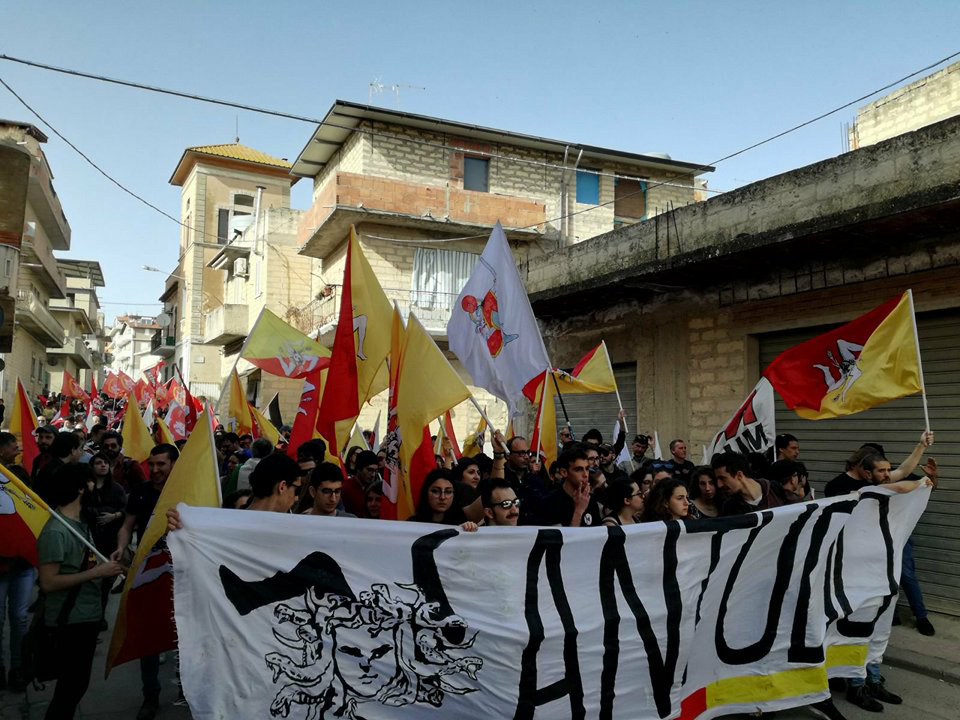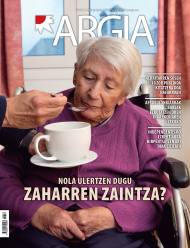
Today it plays the colony role of the Italian republic, in the view of many, and not only as a result of the usual underinvestment in the southern regions, which is now called mezzogiorno. It is the place where the unemployment rate and the social crisis have increased the most in recent decades. The economy at the service of the northern regions, the infested public administration and bureaucracy, the destruction of the industry and the exploited natural resources without meeting the needs of the territory, have condemned him to maintain the policy of dependency.
Cultural (through tourism) and natural (through landfills, incinerators, gas drilling and oil refineries, among others) are the main resources exploited in Sicily. The main export of Sicily is food, which is produced mainly on journalism controlled agricultural holdings. The main labour force is refugees fleeing the wars waged by Western countries, exploited in extreme and precarious conditions. While this oppressive development model turns territory and population into a source of profit, destroys the landscape, absorbs heritage, pollutes land and air, transgresses all kinds of rights and destroys all community relations. In addition, large school absenteeism and youth emigration (175,000 in the last decade) have drawn an even darker future on the island.

Mafia, indigenous Sicilian phenomenon?
Faced with this situation, it is not surprising that many Sicilians are forced to seek ways of survival outside the economy and the official norm. However, the vast phenomenon of illegality should not be confused with the Hollywood image of the Sicilian mafia. The Mafias are networks that use public administration to serve customer relations, that is, economic groups that seek to be masters of a territory with the complicity of local and state political parties. The phenomenon, far from being the heritage of Sicily, occurs everywhere. Also in ours. The most frequent corruption practices occur in the award of public contracts for the management of giant infrastructures and garbage and in the speculative construction of housing. It is well known that Sicily receives waste from all over Italy to accumulate and incinerate it, while the problems of cancer and population health are growing. Only in extreme cases are drugs and human trafficking combined with the activities of these organized criminals.
We must not forget that these mafias returned from the hands of the United States in the post-war period with the aim of neutralising the communist party. There are also many military interests at stake because of the geostrategic importance of the island. The Americans and NATO use their military bases to control the Mediterranean as a whole and carry out war in North Africa and the Middle East. An example of this is Sigonella’s base, known as the world’s “drone capital,” and the antennas of the high-speed telecommunications system MUOS.

All this nourishes and increases the colonial character of the island and the chain of dependence in the Italian State, and there are several historical experiences that have been organized to claim independence. The most prominent were the MIS (Movement for the Independence of Sicily) party, founded in 1943, and the EVIS (Army of Volunteers for the Independence of Sicily), by Antonio Canepa. However, in the post-war period, the moderate flow of the party took control of the movement and was dissolved soon after the status of autonomy was achieved. Since then, the groups that have focused on the Sicilian State have been marginal in the political landscape, most of them with right-wing and traditionalist stains.
The birth of a new movement
Three years ago, Antudo, the focal point of the various popular movements organised at Sicilian level, was set up. It has taken the name of a historic claim for the independence of the island, linked to the intention of recovering the past and fighting the present. Since then they have been engaged in fighting in cities and in rural areas. Initiatives are being organised in Palermo and Catania to meet the basic needs of peripheral neighbourhoods in terms of housing, health and sport. Likewise, it works on the recovery of culture and its own history in the spaces of teaching and training, especially in the university. A network of large, polluting infrastructures and local committees against military bases has been set up in rural areas.
The goal of the movement is to extend the perspective of self-government at all levels, to achieve the independence of state control and capitalism. To do so, they consider it essential to free themselves from colonial oppression, to break the welfare economy and to defend the Sicilian culture. In short, to destroy dependency and to decide the model of management and development of the territory by the local community itself: control over taxes, to allocate the investment of the local institutions to meet their needs, to paralyse the intervention and exploitation of foreign capital, to achieve greater equality and a fairer redistribution, to stop the emigration of young people, to invent new forms of citizen participation or to value the language itself.

Independence is not considered synonymous with managing the current institutional form of power. For Antudo, independence is the form of the answer, but the content is another: to create relations based on solidarity, as seen with the democratic confederalism in Rojava, in Kurdistan. Therefore, its objective is not to achieve a nation of state. They represent a long process from bottom to top, the basis is to generate an awareness contrary to the exploitation of the territory and organize it politically. After analyzing the resistance against the trend towards centralization of power in the processes of Brexit and Catalonia, they have decided to place the sovereignty of the territory at the center of the struggle. That is why they use the Sicilian flag, the trinacria, as a symbol of identification, to focus attention on defending their own home rather than on their ethnic characteristics. For the same reason, they are not seen within the European Union after a hypothetical independence, as they consider it to be an economic mechanism to promote the hegemony of the countries of the north and the movement of goods.
The difficulties, misery of many Sicilians and emigration are no exception. The Italian identity that drives the education system is an obvious obstacle to breaking with colonized thinking, and Sicilian culture and language suffer the contempt of many people. Although the Sicilian government has planned a small attempt to recover the language in schools since 2019, the Sicilian language is very marginalized outside the peripheral neighborhoods and rural areas.
Today, the main challenge of the movement is to answer the question of how to govern a territory without a State structure? In Sicily, and in Palermo in particular, there are many possibilities. Many towns and neighbourhoods feel completely abandoned by the Italian State (except for repression), and Sicilian identity and the tendency towards rebellion are stronger. The southern case, Southern Questione, has always been one of Italy’s problems, and today the key to transformation lies in these territories, because the chain of state structure is weak. The key is to find the key to turning all the options into potential mobilizations. The lesson they have received from Catalonia is that the institutions have to go behind the people, because only that can bring about real changes.
August Camp, a Leap to Light
In August, the movements organized a camp in the village of Petrosino, in the province of Trapani. The objective has been to create a moment of reflection and exchange to analyze the current situation and to develop a future programme that will complement the discourse of independence.

It was also intended to make visible a previously unknown project and to make the leap to public dissemination. These meetings have dealt with many issues in the assemblies. On the one hand, the role of women in the process of liberation and the articulation of the student movement in educational centers and universities. On the other hand, the processes of self-determination have been analyzed in order to integrate into their own process the lessons that can be drawn from them. Aware of the need for solidarity between peoples, the members of Askapena and Endavant spoke about the situation of the Basque Country and the Catalan countries, and the members of Kurdistan explained their experiences. Finally, there was talk about the lines of work for the future to refine the foundations of the struggle.
Although Antudo is still in the process of training, it can be an experience to follow closely. They say that the paths to sovereignty must be created by each territory and they want to be able to reinvent their struggle: to demonstrate that the only effective response to all the challenges mentioned is independence.
Igandean eta astelehenean izango diren Italiako hauteskundeetan parte hartuko duten mugimendu autonomista eta independentisten analisi bat egin du vilaweb.cat webgune kataluniarrak. 630 diputatu eta 315 senatari aukeratuko dituzte, eta guztira 184 hautagaitza aurkeztu dira,... [+]




















